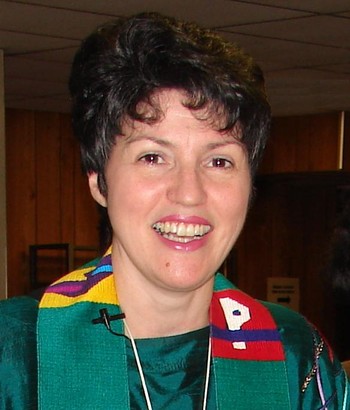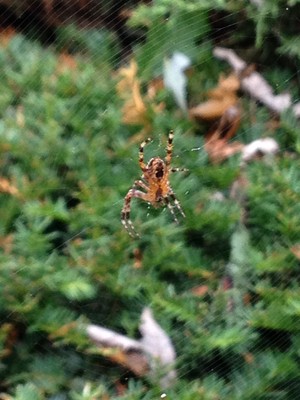A space for a contemporary woman disciple to give voice to justice concerns in a world where some still think that women’s words are just leros (Greek for “nonsense”) or, in Spanish, disparates
 Partners
Partners
A resource for Sunday’s liturgy based on Genesis 2:18–23
by Magdalena I. García
Then the Lord God said, “It is not good that the man should be alone; I will make him a helper as his partner.” So out of the ground the Lord God formed every animal of the field and every bird of the air, and brought them to the man to see what he would call them; and whatever the man called every living creature, that was its name. The man gave names to all cattle, and to the birds of the air, and to every animal of the field; but for the man there was not found a helper as his partner. So the Lord God caused a deep sleep to fall upon the man, and he slept; then he took one of his ribs and closed up its place with flesh. And the rib that the Lord God had taken from the man he made into a woman and brought her to the man. Then the man said, “This at last is bone of my bones and flesh of my flesh; this one shall be called Woman, for out of Man this one was taken.” —Genesis 2:18–23
lower creature
dependent critter
subservient animal
I am not
hired servant
docile maid
domestic beast
I am not
weaker sex
inferior gender
feeble being
I am not
begin by unlearning
the things I am not
then grasp from Genesis
the things we forgot
i am ezer[i]
God is my namesake
I come to your aid
endowed with wisdom and strength
i am ishshah[ii]
next to your heart, at your side[iii]
bone of your bones and flesh of your flesh
equal in every sense
i am your succor
wondrously created and skilled
from affliction and loneliness
I offer you relief
i am your ally
designed for affinity and parity
enabled for reciprocity
I offer you community
we are partners
Forgive us, Helper God,
for belittling those you send our way
who are different in some respect
while calling out to you for aid.
Remind us, Ezer God,
that you made us interdependent
and that we are doomed
to languish and perish
unless we learn to rely
on mutual help.
Magdalena I. García is a PC(USA) teaching elder and a hospice chaplain for Vitas Healthcare in Chicago. She is a graduate of McCormick Theological Seminary and a recipient of the 2008 PC(USA) Women of Faith Award. For permission to use content, write to magdalenagarcia@comcast.net.
Notes
[i] This is the Hebrew word used in Gen. 2:18 and 2:20 to describe the woman’s role, but it is often used in the Scriptures to refer to God as our supreme helper. See Gen. 49:25; Deut. 33:7, 26, 29; 1 Sam. 7:12; Psa. 33:20, 70:5, 115:9-11, 121:1-2, 124:8, 146:5; Isa. 41:10-14; Hos. 13:9.
[ii] Hebrew word for woman in Gen. 2:23.
[iii] The Hebrew word tsela is most often translated in the Scriptures as “side” instead of “rib”.

A tiny spider hanging on to its fragile web reminds us of the interrelation of all life.
Compañer@s
Un recurso para la liturgia dominical basado en Génesis 2:18–23
por Magdalena I. García
Después Dios el Señor dijo: “No está bien que el hombre esté solo; le haré una ayuda a su medida”. Y así, Dios el Señor formó de la tierra todos los animales del campo, y todas las aves de los cielos, y se los llevó a Adán para ver qué nombre les pondría; y el nombre que Adán les puso a los animales con vida es el nombre que se les quedó. Adán puso nombre a todos los animales y a las aves de los cielos, y a todo el ganado del campo, pero para Adán no se halló una ayuda a su medida. Entonces Dios el Señor hizo que Adán cayera en un sueño profundo y, mientras éste dormía, le sacó una de sus costillas, y luego cerró esa parte de su cuerpo. Con la costilla que sacó del hombre, Dios el Señor hizo una mujer, y se la llevó al hombre. Entonces Adán dijo: “Ésta es ahora carne de mi carne y hueso de mis huesos; será llamada ‘mujer’,porque fue sacada del hombre”. —Génesis 2:18–23
criatura inferior
sabandija dependiente
animal subordinado
no soy
sirvienta contratada
criada dócil
bestia domesticada
no soy
sexo débil
género inferior
ser endeble
no soy
comienza desaprendiendo
lo que nunca he sido
luego capta de Génesis
lo que condenamos al olvido
soy ezer[i]
Dios es mi tocayo
vengo en tu ayuda
dotada con sabiduría y fortaleza
soy ishshah[ii]
junto a tu corazón, en tu costado[iii]
carne de tu carne y hueso de tus huesos
igual en todo sentido
soy tu socorro
maravillosamente creada y capacitada
de la aflicción y la soledad
te ofrezco alivio
soy tu aliada
diseñada para la afinidad y la paridad
habilitada para la reciprocidad
te ofrezco comunidad
somos compañer@s
Perdónanos, Dios Ayudador,
por menospreciar a quienes tú nos envías
que son diferentes en algún aspecto
mientras clamamos por tu auxilio.
Recuérdanos, Dios Ezer,
que tú nos hiciste interdependientes
y que estamos condenados
a languidecer y perecer
a menos que de la ayuda mutua
aprendamos a depender.
Magdalena I. García es anciana docente en la IP(EUA) y capellana de hospicio para Vitas Healthcare en Chicago. Se graduó del Seminario Teológico McCormick y recibió el Premio a las Mujeres de Fe de su denominación en el 2008. Para solicitar permiso para usar el contenido, escriba a: magdalenagarcia@comcast.net.
[i] Esta es la palabra hebrea que se usa en Gén. 2:18 y 2:20 para describir la función de la mujer, pero se usa a menudo en las Escrituras para referirse a Dios como el ayudante supremo. Vea Gén. 49:25; Deut. 33:7, 26, 29; 1 Sam. 7:12; Sal. 33:20, 70:5, 115:9-11, 121:1-2, 124:8, 146:5; Isa. 41:10-14; Ose. 13:9.
[ii] La palabra hebrea que se traduce como mujer en Gén. 2:23.
[iii] La palabra hebrea tsela se traduce frecuentemente en las Escrituras como “costado” en vez de “costilla”.